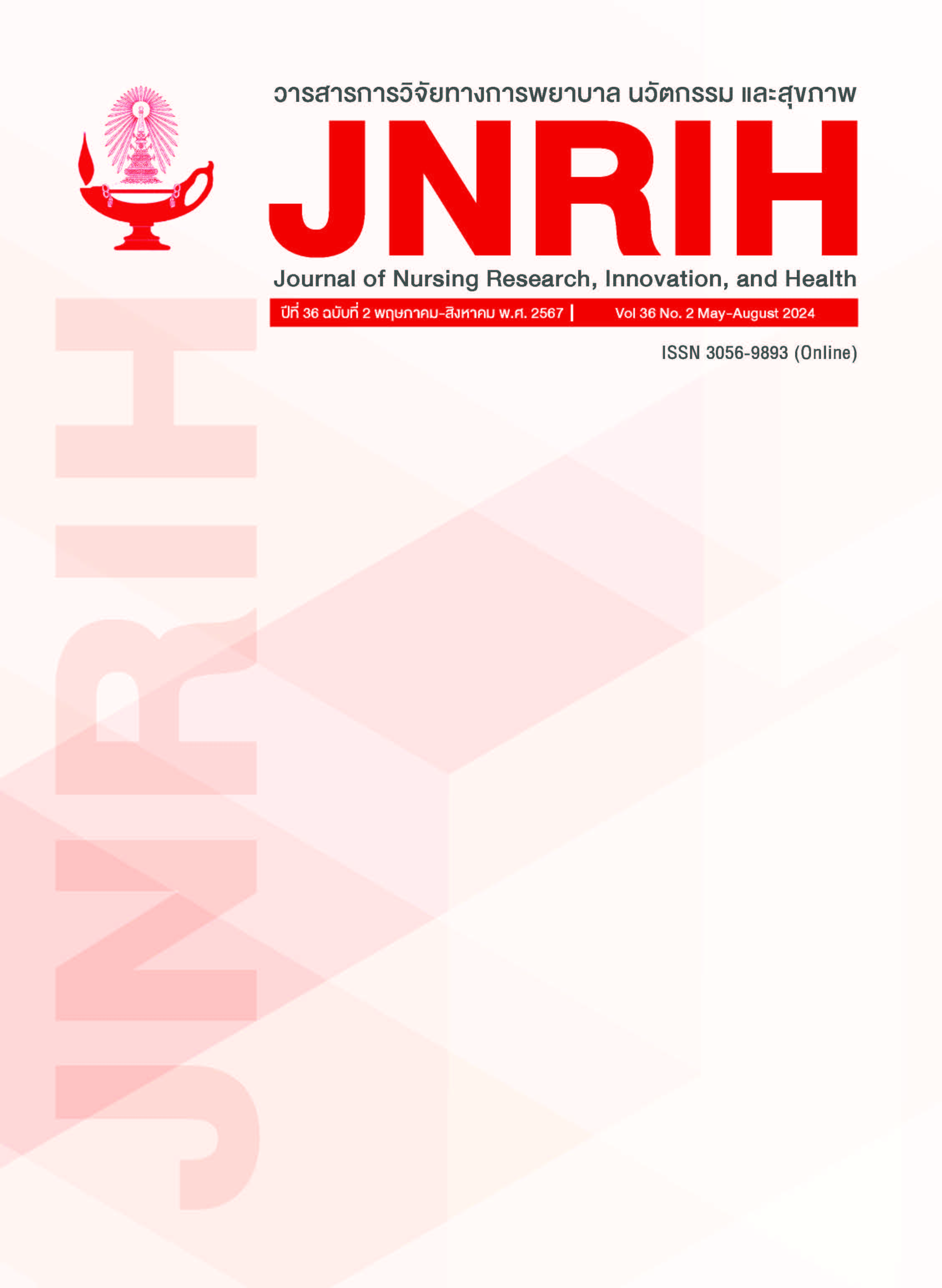ผลของโปรแกรมการฟื้นคืนสู่สุขภาวะต่ออาการซึมเศร้า ของผู้สูงอายุโรคซึมเศร้าในชุมชน
คำสำคัญ:
โปรแกรมการฟื้นคืนสู่สุขภาวะ, อาการซึมเศร้า, ผู้สูงอายุโรคซึมเศร้าในชุมชนบทคัดย่อ
วัตถุประสงค์: เพื่อศึกษาผลของโปรแกรมการฟื้นคืนสู่สุขภาวะต่ออาการซึมเศร้าของผู้สูงอายุโรคซึมเศร้าในชุมชน
รูปแบบการวิจัย: งานวิจัยกึ่งทดลอง
วิธีดำเนินการวิจัย: กลุ่มตัวอย่าง คือ ผู้สูงอายุโรคซึมเศร้าในชุมชนที่มีอายุ 60 ปีขึ้นไป ที่ได้รับการวินิจฉัยว่าเป็นโรคซึมเศร้า มีคุณสมบัติตามเกณฑ์ โดยได้รับการสุ่มเข้ากลุ่มทดลองและกลุ่มควบคุม กลุ่มละ 21 คู่ กลุ่มทดลองได้รับโปรแกรมการฟื้นคืนสู่สุขภาวะผู้สูงอายุโรคซึมเศร้าเป็นระยะเวลา 3 สัปดาห์ ส่วนกลุ่มควบคุมได้รับการพยาบาลตามปกติ เครื่องมือที่ใช้ในการวิจัย คือ 1) โปรแกรมการฟื้นคืนสู่สุขภาวะผู้สูงอายุโรคซึมเศร้า และ 2) แบบประเมินภาวะซึมเศร้าของเบคฉบับภาษาไทย มีค่าดัชนีความตรงเชิงเนื้อหา เท่ากับ .81 และมีค่าความเที่ยงสัมประสิทธิ์อัลฟ่าของครอนบาค เท่ากับ .80 วิเคราะห์ข้อมูลโดยใช้สถิติทดสอบที
ผลการวิจัย: 1) คะแนนเฉลี่ยอาการซึมเศร้าของผู้สูงอายุโรคซึมเศร้าในชุมชนที่ได้โปรแกรมการฟื้นคืนสู่สุขภาวะน้อยกว่าก่อนเข้าร่วมโปรแกรม อย่างมีนัยสำคัญทางสถิติที่ระดับ .05 และ 2) คะแนนเฉลี่ยอาการซึมเศร้าของผู้สูงอายุโรคซึมเศร้าในชุมชนกลุ่มที่ได้รับโปรแกรมการฟื้นคืนสู่สุขภาวะน้อยกว่ากลุ่มที่ได้รับการพยาบาลตามปกติอย่างมีนัยสำคัญทางสถิติที่ระดับ .05
สรุปผลของ: ผลของโปรแกรมการฟื้นคืนสู่สุขภาวะสามารถลดอาการซึมเศร้าของผู้สูงอายุโรคซึมเศร้าในชุมชนได้ และดีกว่ากลุ่มที่ได้รับการพยาบาลตามปกติ
เอกสารอ้างอิง
United Nations, Department of Economic and Social Affairs. World population ageing 2019: Highlights [Internet]. New York: United Nations; 2019 [cited 2023 Jun 14]. Available from: https://www.un.org/en/development/desa/population/publications/pdf/ageing/WorldPopulationAgeing2019-Highlights.pdf
Ministry of Public Health. Assessment of depressive disorder (9Q) in the elderly group, Fiscal Year 2566 [Internet].[Nonthaburi]: Ministry of Public Health; [updated 2024 Jun 14; cited 2023 Jun 14]. Available from: https://hdcservice.moph.go.th/hdc/reports/report.php? source=pformated/format1.php&cat_id=574437c29aff8d1709da55677abc4b03&id=1cabe82729905e268bb97fed7cb117dd#
Department of Mental Health. Report on access to services of elderly depressed patients, the cumulative number since the year 2009 to present as of 30 September 2019 [Internet]. [cited 2023 Jun 14]. Available from: https://thaidepression.com/www/report/main_report/pdf/ahb-30-09-19_mix.pdf
Department of Mental Health. Report on access to services for patients with depression, fiscal year 2023, February (HDC database) [Internet]. [cited 2023 Jun 14]. Available from: https://thaidepression.com/www/report/main_report/pdf/ahb-02-23-mix_HDC.pdf
Department of Mental Health. Open the statistics of depression and Thai society’s Emotional silence of the new generation. [Internet]. [Nonthaburi]: Ministry of Public Health; [updated 2022 Jan 18; cited 2023 Jun 14]. Available from: https://dmh.go.th/news-dmh/view.asp?id=31459
Suicide Prevention of Thailand. The National Data Suicide Rates of Thailand in the Year 1997-2020, died according to the house registration [Internet]. [Nonthaburi]: Khon Kaen Rajanagarindra Hospital; [date unknown; cited 2023 Jun 14]. Available from: https://suicide.dmh.go.th/report/suicide/english/stat_province10.asp?ndead=2
Puttametta M, Soonthornchaiya R. Selected factors related to depression of the older persons with depressive disorder in the central region. JPNMH. 2016; 30(2):69-82. [In Thai].
Maier A, Riedel-Heller SG, Pabst A, Luppa M. Risk factors and protective factors of depression in older people 65+: A systematic review. PLoS One. 2021;16(5):1-38.
Copeland ME. Wellness recovery action plan. OTMHealth. 2002;17(3-4):127-50.
Cook JA, Copeland ME, Floyd CB, Jonikas JA, Hamilton MM, Razzano L, et al. A randomized controlled trial of effects of Wellness Recovery Action Planning on depression, anxiety, and recovery. Psychiatr Serv. 2012;63(6):541-7.
Aljeesh YI, Shawish MA. The efficacy of wellness recovery action plan (wrap) on patients with major depressive disorder in Gaza strip. Int J Psychiatry. 2018;3(1):2-3.
Mak WWS, Tsoi EWS, Wong HCY. Brief Wellness Recovery Action Planning (WRAP(®)) as a mental health self-management tool for community adults in Hong Kong: A randomized controlled trial. J Ment Health. 2024;33(2):236-43.
Beck AT, Steer RA, Brown GK. Manual for the Beck Depression Inventory-II. San Antonio, TX: Psychological Corporation; 1996.
Rachamanee S, Kornpetpanee S, Wongupparaj P. Development of the multitask computer program for assessing depression with electroencephalogram measurements in Thai adolescents. Research Methodology and Cognitive Science 2018;16(1):122-137.
Hancock N, Scanlan JN, Bundy AC, Honey A. Recovery assessment scale-domains and stages (RAS-DS) manual-version 2. [Sydney]: The University of Sydney; 2016.
Hancock N, The University of Sydney. RAS-DS (Recovery Assessment Scale-Domains and Stages)-Thai Translation [Internet]. [cited 2023 Jun 14]. Available from: https://ras-ds.net.au/wp-content/uploads/2020/07/RAS-DS_2016_Thai.pdf.
Ingram RE, Miranda J, Segal ZV. Cognitive vulnerability to depression. [place unknown]: Guilford Press; 1998.
Colodro-Conde L, Couvy-Duchesne B, Zhu G, Coventry WL, Byrne EM, Gordon S, et al. A direct test of the diathesis-stress model for depression. Mol Psychiatry. 2019;23(7):1590-6.
ดาวน์โหลด
เผยแพร่แล้ว
ฉบับ
ประเภทบทความ
สัญญาอนุญาต
ลิขสิทธิ์ (c) 2024 วารสารการวิจัยทางการพยาบาล นวัตกรรม และสุขภาพ

อนุญาตภายใต้เงื่อนไข Creative Commons Attribution-NonCommercial-NoDerivatives 4.0 International License.
##default.contextSettings.thaijo.licenseTerms##


